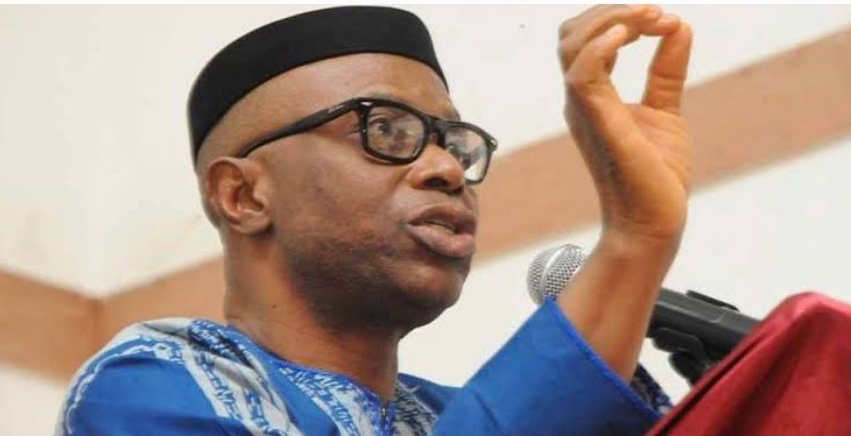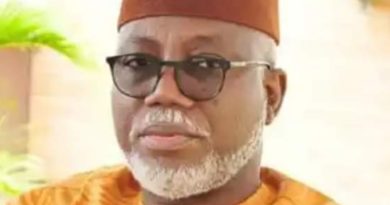The Poor Also Deserve Education – Mimiko
Former Ondo State Governor, Dr Olusegun Mimiko on Thursday said the poor, now more than ever before, deserve education, adding that government at all levels must pay attention to education such that the less privileged will not be left behind.
Mimiko while delivering the University of Benin Convocation Lecture titled: “The Poor Also Deserve Education: Our Founding Heroes’ Legacies In Educational Equity and Equality,” also said that the obvious disparity in the standard of education between the Northern and the Southern parts of Nigeria ought to be frontally tackled to bring needed equity and equality in access and opportunities to all.
The former Ondo Governor added that the structure of Nigeria, which concentrates too much power in the centre and deprives the federating units needed power and resources cannot but impede desired growth and development, hence reiterating his call for another look at reworking the constitution of the Federal Republic.
Mimiko early in his lecture established the connection between the policies, planning and actions of past leaders as they relate to growth and development, paying particular attention to the Obafemi Awolowo era of governance of the South West.
“With a very clear ideological orientation on the pivotal place of education in the life of an individual, and its catalysing role in social development, Awolowo knew what he wanted. Surrounded by a class of equally foresighted leaders like Adekunle Ajasin and Stephen Awokoya among others, he began to redefine the concept of education, including its purpose, conception, and in particular, delivery.
“This was indeed, the very beginning of the ideas of equity and equality in Nigeria’s educational landscape, as it were. These were the circumstances under which the regional government, which Awolowo led, birthed the Universal Primary Education (UPE) programme in 1955,” Mimiko said.
He said Awolowo “did not only make education free, but knowing that tradition, custom, and the pattern of economic engagement (farming, which require many hands) may make people look upon the offer of free education with suspicion, Awolowo also made it compulsory,”
According to him, “hundreds of thousands of youths in the old Western Region who would not have known formal education, got registered into the Awolowo schools. Awolowo’s Sword of Damocles, hanging around the neck of whichever parent that would not register their wards in school, practically made it possible for all of the basically disadvantaged children to go to school….Thus, with his policy on education, Awolowo had unleashed a deliberate process of building a new society, and by so doing affirming the ramifying impact of education.”
The two-term former governor had earlier in his presentation justified his use of the Awolowo example for the obvious reason, he says, “of its being the most profound and successful of any attempt, arguably on the continent of Africa, to transform society via education.”
He itemised such key ingredients as “a clear and well-articulated vision,” planning, appropriate funding and discernible commitment to the success of the initiative as core lessons that could be taking away from the successful experience of the Awolowo era in the education sector, lessons he feels contemporary leaders ought to emulate.
Mimiko who contended that such policies as federal character, and quota system though justifiable argued that “lowering standard as a disparity management strategy can only be a very temporary measure, which could be counterproductive, as the Nigeria picture would seem to have demonstrated.”
On the structure of Nigeria and how it has promoted poverty and underdevelopment, Mimiko said “the need to reorganise the political system, within which realities of deprivation fester, is a critical desideratum.” Wondering if the Nigerian political system is so organised to tackle the grinding challenges of poverty he said “the system as structured is too centralised, and power is too concentrated at the central government, in a manner that limits the possibilities of regional or sub-national development, as the case may be.”
He added that a holistic overhaul of the structures of governance, including the document that gives definition to it, the 1999 Constitution (as amended), be undertaken.
“This, I actually regard as the most pressing challenge of the moment, which President Bola Ahmed Tinubu must give attention to. Only this, can reinforce the bouquet of economic reformatory policies coming from his stable. If and when this basic principle is agreed to, the modalities of implementation can easily be worked upon and straightened out. Nigeria can only be better, more prosperous, and united thereby,” he concluded.
In her opening remarks, the Vice Chancelor, Professor Lilian Salami, said the University of Benin has continued to build on her successes and would not rest on her oars.
She said the jouney on University of Benin this past 54 years has been marked with monumental achievements adding that the unversity has fulfilled the goals and aspirations of her founding fathers.
She added that the lecture will be useful to all stakeholders in the education sector as well as policy makers



